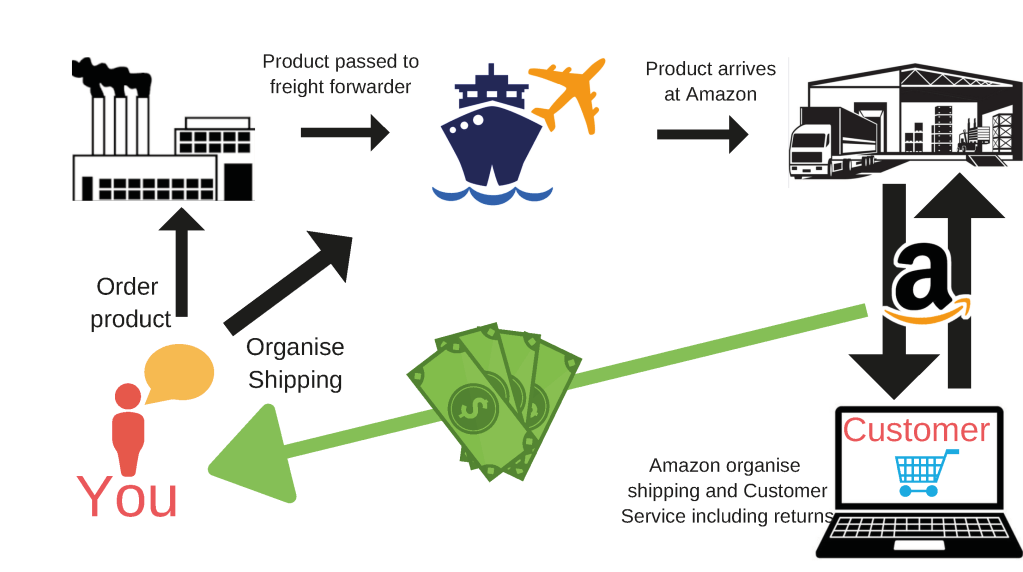If you’ve thought about selling on Amazon, there’s more to it than you might think, and it’s highly competitive.
One term to know about is Fulfillment by Amazon or FBA. This is a service from Amazon that helps you with inventory management, including storage, packaging, and shipping. The idea behind FBA is that it helps sellers remove some of the burden off themselves and be more flexible in how they sell things.
With FBA, you ship your items to a fulfillment center, and the items are stored in Amazon warehouses until they sell.
When you sell something on Amazon, employees of the company prepare the item, package it up and ship it out.
It can sound great, but there are potential downsides to consider, as well.
Table of Contents
How It Works
First, you need a Selling account on Amazon, and then you can add FBA to that account.
Once you do that, create product listings. You can integrate your inventory management software with the Amazon API, or you can add things one at a time or in bulk.
Then, according to Amazon, you should make sure your products are ready for e-commerce so that they can reach your customers in good shape.
Once those steps are done, you ship your products to Amazon, and after customers start ordering, Amazon fulfills the orders.
Theoretically, Amazon provides customer support on the products you sell, although that doesn’t necessarily mean you won’t be dealing with some customer service issues.
What Are the Benefits of FBA?
Your customers will get free two-day shipping if you use FBA and that Prime option is one of the biggest perks of using this offering from Amazon.
Shipping speed and price are two of the most important considerations most customers have in mind when they make a purchase decision.
If you sell on Amazon, then your FBA items are then eligible for free shipping and that’s going to mean you rank higher on the product listings, which improves your visibility as well.
Your customers can contact Amazon customer service so you can focus on other things, although again, as was mentioned you’re probably still going to need to manage some of your customer service.
When you use FBA, returns can be processed through Amazons as well, so you don’t have to worry about that.
Basically, what FBA does is make your life easier and provide a better customer experience.
What About the Downsides?
There are some issues to be aware of before you decide on FBA.
Amazon ships products from whatever warehouse can get them to the buyer in the fastest way. You can, as a result, comingle your products or pool them.
If you comingle your products, it means that certain products from other sellers are combined for processing and shipment.
You can use a barcode to pool items.
At this point, while it can seem convenient, you may face issues with quality control. Customers can receive fake or damaged items instead of what they ordered, meaning negative reviews.
These reviews wouldn’t be your fault, but you still have to be accountable for them.
Amazon also charges you to maintain your inventory, and if items are stored for more than six months, they charge you more. If you have items that tend to sit for longer, be aware that it could cost you and may not ultimately be worth those costs.
Along with storage fees, Amazon charges fulfillment fees.
There’s something else to think about. Since Amazon FBA makes returns so easy, that can come with its own potential downside. When it’s easy, customers are more likely to make returns. There’s really no effort required on their part to do so.
It can also be tough to track your inventory, and sales tax can be complex because there’s inventory in different warehouses in different states around the country.
What’s Your Role with FBA?
When you use FBA, what’s your role as a seller?
First, you need to decide on the products you’re going to be selling, with an eye toward those inventory storage fees. You need to choose things that are going to sell fast enough.
You’ll also need to manage your inventory levels and make sure the items you sell are in-stock.
Perhaps the biggest thing you’ll focus on are marketing and advertising. That’s a lot of the beauty of FBA—it lets you put most of your attention on these areas that help you grow your business.
So is Amazon FBA the right option for you? Maybe, but weigh the pros and cons first and do some math as far as the fees and whether it will be worth it.





